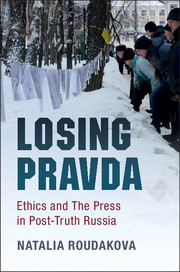Crossref Citations
This Book has been
cited by the following publications. This list is generated based on data provided by Crossref.
Hallin, Daniel C.
and
Mancini, Paolo
2017.
Ten Years After Comparing Media Systems: What Have We Learned?.
Political Communication,
Vol. 34,
Issue. 2,
p.
155.
Sichinava, David
2017.
Cleavages, electoral geography, and the territorialization of political parties in the Republic of Georgia.
Eurasian Geography and Economics,
Vol. 58,
Issue. 6,
p.
670.
HUXTABLE, SIMON
2018.
Making News Soviet: Rethinking Journalistic Professionalism after Stalin, 1953–1970.
Contemporary European History,
Vol. 27,
Issue. 1,
p.
59.
2018.
Channeling the State.
p.
164.
Brock, Maria
2018.
Political satire and its disruptive potential: irony and cynicism in Russia and the US.
Culture, Theory and Critique,
Vol. 59,
Issue. 3,
p.
281.
2018.
Channeling the State.
p.
227.
2018.
Channeling the State.
p.
23.
2018.
Channeling the State.
p.
1.
Mihelj, Sabina
and
Huxtable, Simon
2018.
From Media Systems to Media Cultures.
2018.
Channeling the State.
p.
62.
Haigh, Maria
Haigh, Thomas
and
Kozak, Nadine I.
2018.
Stopping Fake News.
Journalism Studies,
Vol. 19,
Issue. 14,
p.
2062.
2018.
Channeling the State.
p.
196.
2018.
Channeling the State.
p.
89.
2018.
Channeling the State.
p.
128.
2018.
Channeling the State.
p.
251.
Slavtcheva-Petkova, Vera
2018.
“Post-Truth” Politics, Journalistic Corruption and the Process of Self-Othering.
Journalism Studies,
Vol. 19,
Issue. 13,
p.
1980.
2018.
Channeling the State.
p.
241.
Wengle, Susanne
and
Evans, Christine
2018.
Symbolic state-building in contemporary Russia.
Post-Soviet Affairs,
Vol. 34,
Issue. 6,
p.
384.
Peterson, Mark Allen
2019.
The International Encyclopedia of Journalism Studies.
p.
1.
KURTOVIĆ, LARISA
2019.
Interpellating the state.
American Ethnologist,
Vol. 46,
Issue. 4,
p.
444.



